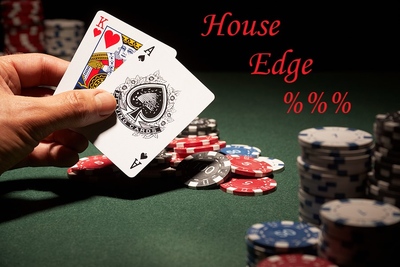 Every casino game has a house edge, and this is the advantage that the house has over the player because of the way the game has been designed. It’s how they guarantee to make money in the long run and is a theoretical number based on a very large sample of hands played.
Every casino game has a house edge, and this is the advantage that the house has over the player because of the way the game has been designed. It’s how they guarantee to make money in the long run and is a theoretical number based on a very large sample of hands played.
The house edge in blackjack is one of its main attractions as it is so low, just 0.5%, although a number of things can affect this. The edge comes mainly from the player busting and from the fact that the player has to make decisions on their hand while only knowing what one of the dealer’s cards is.
Knowing the pitfalls of the game is one way to give yourself the best chances of winning and avoid handing the casino any extra advantage, and there are even ways to bring the edge down further if you are a very smart player.
How Does House Edge Work in Blackjack?
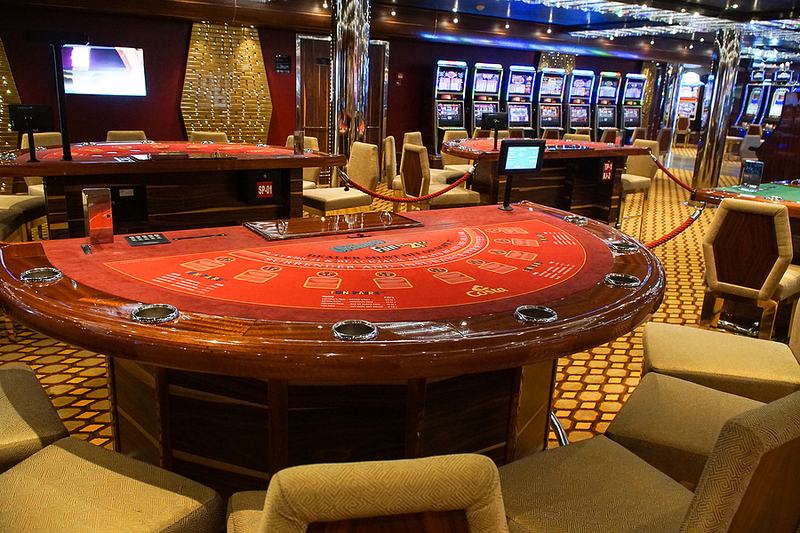
Unlike games like roulette which are based purely on chance, the players themselves have a huge impact on the house edge of blackjack because they have decisions to make.
To explain this using a slightly ridiculous example; if you played 50 hands and hit until you bust on every single one of them you would obviously lose every single hand, and the house edge would therefore be 100%. The casino would keep every penny of every pound wagered. This disastrous house edge would be completely down to you, because you were making the bad decisions – even if you had stood on every single hand you would have won some of them, right?
This is why the house edge isn’t set in stone.
It’s not just a player’s skill that can affect the edge either. There are a great many blackjack games with different rules and payouts, all of which have an impact on the house edge.
Number of Decks Used
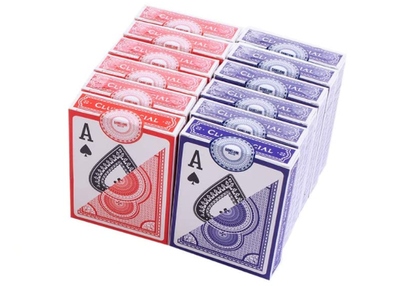 Blackjack was originally played with just the one deck, but players soon got wise as to how to take advantage of this using systems like card counting, so casinos started using more decks.
Blackjack was originally played with just the one deck, but players soon got wise as to how to take advantage of this using systems like card counting, so casinos started using more decks.
Six or eight deck games are most common, but any number can be used and some single deck games still exist.
The number of decks affect the house edge because of your chances of getting blackjack. The more likely you are to get it the lower the house edge, because it pays out at 3:2 (in most games) instead of 1:1.
In a single deck game, if you are dealt an Ace there are 51 more cards in the shoe and 16 of them are worth 10, so you have a 16/51 chance of being dealt blackjack – that’s 31.37%.
In an 8 deck game, if you are dealt an Ace there are 415 more cards in the shoe and 128 of them are worth 10, so you have a 128/415 chance of being dealt blackjack – that’s 30.84%.
Only a slight change, but when the house edge is so low anyway it makes a difference.
Doubling Rules
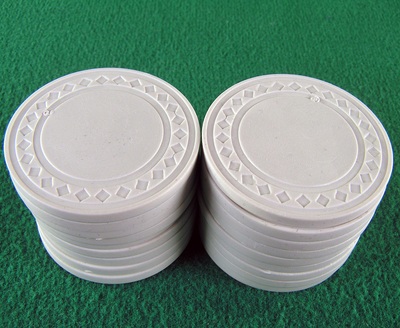 The option to double when your hand is strong against the dealer’s up card gives you the chance to win twice as much money as well as the advantage of knowing your starting hand before you make the call.
The option to double when your hand is strong against the dealer’s up card gives you the chance to win twice as much money as well as the advantage of knowing your starting hand before you make the call.
Some casinos allow doubling on any hand which can knock around 0.2% off the house edge, whereas others will only allow it if your hand totals 9, 10, or 11..
Whether or not you can double after splitting is another consideration. If you are allowed then this can account for another 0.15% of the house edge.
Of course, this also relies on you playing a perfect basic strategy.
Dealer Standing or Hitting on Soft 17
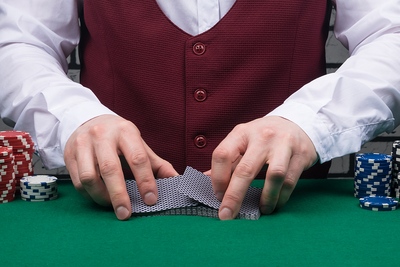 All games will have the dealer rules written on the table.
All games will have the dealer rules written on the table.
A ‘soft’ number is one containing an Ace, so Ace, 5 and 2 = a soft 17; a ‘hard’ number is a hand without an Ace, so 10 and 7 = a hard 17. This is because the Ace can be an 11 or a 1, so a soft 17 that hits could draw a 10 an not go bust, because the Ace becomes a 1 instead – Ace, 5, 2 and 10 = 18.
If the dealer has to stand on a soft 17 they will keep dealing themselves cards until they hit this target or go above it and then stop. This will be their final hand.
If the dealer has to hit on a soft 17 then they will take one more card if they end up with a hand containing an Ace worth 17.
The latter rule sees the dealer go bust more frequently, but when they don’t they often end up with a much stronger hand and either beat the player or equal them.
This can actually push the house edge up by around 0.2%.
Blackjack Paying 6:5
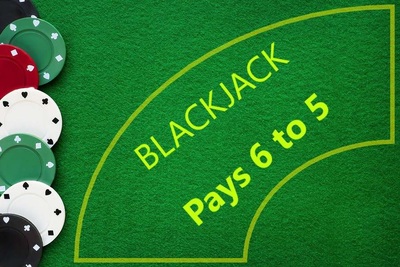 This is obviously a lower payout than the more regular 3:2, but many blackjack games – especially those with extra features – will employ this lower payout as a way of balancing the game.
This is obviously a lower payout than the more regular 3:2, but many blackjack games – especially those with extra features – will employ this lower payout as a way of balancing the game.
A £10 stake paid out at 3:2 (or 1.5:1) would return £25, whereas a £10 stake paid out at 6:5 (or 1.2:1) would only return £22.
This obviously has a negative effect on the house edge from the players point of view, bumping the house edge up as much as 1.5%.
That’s huge when compared to the regular edge of 0.5%, it’s 3 times as much!
Needless to say then, games that pay out at 6:5 for blackjack are to be avoided.
Variance or Volatility
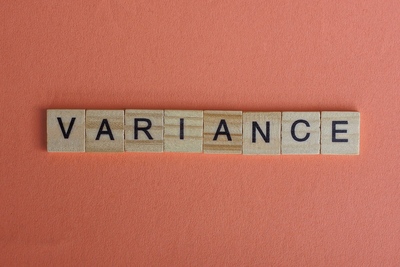 It’s worth explaining that just because the maths can tell us the house edge or the statistical probability of something happening, that doesn’t guarantee the outcome.
It’s worth explaining that just because the maths can tell us the house edge or the statistical probability of something happening, that doesn’t guarantee the outcome.
House edge is theoretical and is calculated over an extremely large number of hands. If you were to play optimally with a house edge of 0.5% but only played 10 hands worth £10 each you would have wagered £100 in total. But you wouldn’t walk away with £99.50 in your pocket (£100 minus 0.5%).
Variance or volatility is the expression for the ups and downs seen in casino games. Sometimes the player might win ten times in a row, other times they might lose ten times in a row, but over thousands of hands this would level out and settle somewhere around the theoretical house edge.
This is why casino games or players can feel ‘hot’ or ‘cold’. They’re not hot, it’s just that variance happens to be working in your favour at that point. There’s nothing you can do about it.
Statistically though, it makes sense to play games where chance is on your side as much as possible so the lower the house edge the better, then you just have to hope things go your way more often than not.
Blackjack Side Bets House Edge
There are many different blackjack side bets, as well as a few ‘features’ that have worked their way into the game online and even jackpots. These all have their own house edges and the same side bet in one game might not have the same edge in another, it depends what rules are being played, the number of decks being used, etc.
For that reason it is not really possible to tell you categorically what the house edge is for the different types of side bets, but we can give you an idea.
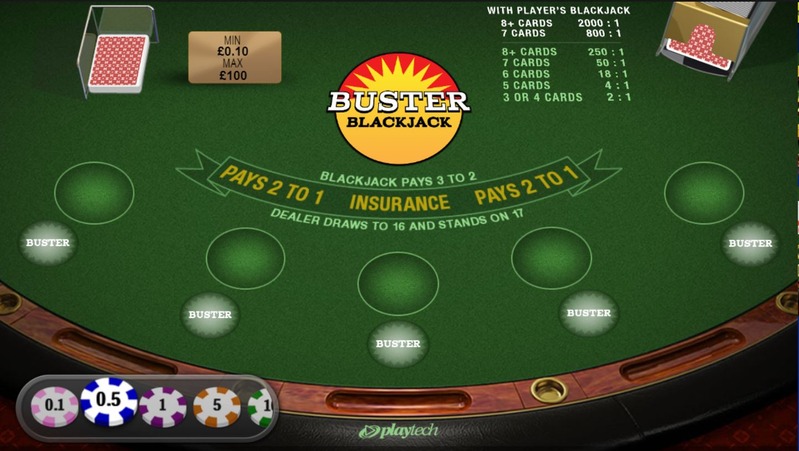
One popular side bet is the Buster; a bet that the dealer will go bust. In Buster Blackjack this side bet has a house edge of 6.21%, but the trade off is that it will pay out at between 2:1 and 8:1 depending on how many cards the dealer takes before they bust.
This is a common scenario – much better potential payouts in exchange for a much higher house edge.
The house edge for the base game remains the same in this situation, as the side bet does not affect what happens there. There are other games, however, which have a feature built in rather than a side bet.
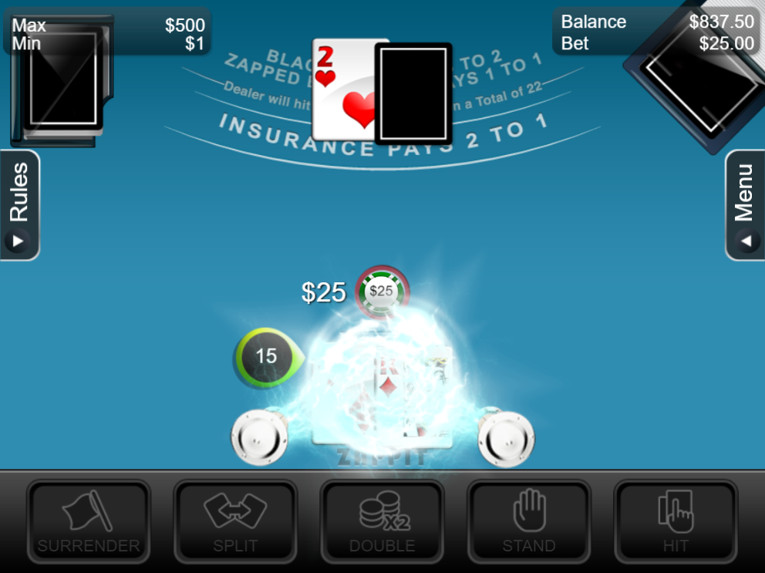
Zappit Blackjack is a good example of this. The player can ‘zap’ their cards if they have 15, 16, or 17 and exchange them for new ones. This is all very well but in exchange a blackjack from a zapped hand only pays out at 1:1 and the dealer pushes on 22 which, coupled with the dealer hitting on a soft 17 does not spell good news for the player.
The house edge is between 1.15% and 1.25% – very high indeed despite how promising it sounds.
Each game is different though, and some offer a better deal than others.
Questions About the Blackjack House Edge
Why is the House Edge so Low in Blackjack?
The edge is actually variable as we have explained, so the casino can afford the edge to be so low for the few players who play the game optimally, because there are many more who do not.
For everyone playing at 0.5% or less, there are twice as many if not more playing at closer to 2% and maybe even worse. This means the casino is making plenty from blackjack.
What is the Perfect Blackjack Strategy to Get then Lowest House Edge?
It depends on the rules of the game and how many decks are in use.
There are strategy cards all over the internet for all of the different games that tell you exactly when to hit, stand, split, double, surrender, etc. all based on your hand and the dealer’s up card.
You can see an example on our How to Play Blackjack page.
Can You Get an Edge Over the Dealer in Blackjack?
Under certain conditions and if you play optimally and also count cards then yes it is possible to play with an edge over the dealer. However, it’s tricky to master and you have to play long enough for the edge to kick in.
Casinos are pretty good at catching card counters too, and they can quite simply ask you to leave if they suspect you of it. It’s impossible to count cards online because the game runs on an RNG and shuffles automatically after each hand.
